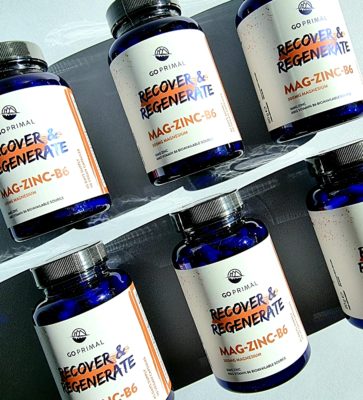
Magnesium, Zinc and Vitamin B6.
 Many people ask us if our magnesium and zinc complex is a ZMA product. This is a common misconception but here we explain the difference. Long story short, ZMA is an old formulation using low bioavailable and less effective sources , even though they found evidence of performance benefits, it`s far from what you can achieve with a proper formulation.
Many people ask us if our magnesium and zinc complex is a ZMA product. This is a common misconception but here we explain the difference. Long story short, ZMA is an old formulation using low bioavailable and less effective sources , even though they found evidence of performance benefits, it`s far from what you can achieve with a proper formulation.
What is ZMA? ZMA is a popular supplement that typically contains the following:
Zinc monomethionine: 30 mg — 270% (RDI) Magnesium aspartate: 450 mg — 110% of the RDI Vitamin B6 (pyridoxine): 10–11 mg — 650% of the RDI This formulation contains high doses of each ingredient, but as the sources have low bioavailability(forms are not from natural sources) your body is not absorbing most of it or even none of it. As a result the effectiveness of this product is very low, which is quite normal as this formulation was created many years ago and technology has advanced and improved. In 2000, researchers gave ZMA supplements to a group of NCAA football (1) players working out twice a day. After 7 weeks, they found a significant increase in the players’ testosterone and growth hormone, both of which are linked to muscle growth. However, one of the scientists who conducted the study holds the registered trademark for the original formula of ZMA, and their company funded the research. Further experiments done by other scientists haven’t duplicated the same effects. In fact, there’s no additional research that ZMA aids athletic performance or weight loss. Because of that, the International Society of Sports Nutrition has declared ZMA’s effect on muscle building “not known,” and the Australian Institute of Sport, which informs athletes about supplements, has decided that ZMA is lacking clear proof of benefits. There are no similar supplement-rating organizations in the U.S.
Why GoPrimal Recover and Regenerate, Magnesium-zinc complex provides many excepcional benefits for your health, recover and performance.
Our complex is formed by: Magnesium Taurinate and Bisglycinate - 300mg Zinc Picolinate - 16mg Vitamin B6 - 4mg A deficiency in either of these minerals will reduce your production of testosterone, a hormone that affects muscle mass and other parameters, as well as insulin-like growth factor (IGF-1), a hormone that affects cell growth and recovery with a direct impact. (2) Furthermore, many athletes normally have low zinc and magnesium levels, which can compromise and reduce their performance. Lower zinc and magnesium levels may be the result of strict diets and also a modern lifestyle with high levels of stress, poor food quality and other factors, but also losing more zinc and magnesium through sweat or urination (3)
 The Causes of Magnesium Deficiency
The Causes of Magnesium Deficiency
It`s widely known, that over 80% of people in western countries suffer from magnesium deficiency(4,5). Due to the excessive cultivation of agricultural products(modern farming) and the use of pesticides have decreased magnesium content in the soil. Moreover the food industry using high temperature and high processed food and artificial ingredients have cause that the majority of food we it have lost their nutritional value. So, it is hard for people to get magnesium, but easy to lose, specially if you do exercise, if you sweat a lot or if you are stressed.
- The causes of magnesium deficiency and why magnesium is being removed from your body:
- Stress
- Alcohol and coffee
- Eating too many sweets
- Antibiotics
- Diuretics
- Laxatives
- Cardiac assist devices
- Vitamin E
The Signs of Magnesium Deficiency
- Leg cramps and “running ants” feeling
- Tension in the body
- Twitching eyelids
- Persistent fatigue and nervousness
- Light sleep or lack of sleep
Magnesium bisglycinate and its benefits for sleep and recovery
Magnesium bisglycinate has been shown to have a good absorption rate with less of a laxative effect. This is likely because it’s absorbed in a different area of your intestine, compared with many other forms of magnesium supplements (6). Adequate magnesium levels are important for a good night's sleep, studies shown(7). Magnesium helps your body and brain to relax. In order to fall asleep and stay asleep, your body and brain need to stay in a prolonged status of relaxation. On a chemical level, magnesium aids this process by activating the parasympathetic nervous system, the system responsible for getting you calm and relaxed.(7) Magnesium regulates neurotransmitters, which send signals throughout the nervous system and brain. It also regulates the hormone melatonin, which is in charge of guiding sleep-wake cycles in your body. Then this mineral binds to gamma-aminobutyric acid (GABA) receptors. GABA is the neurotransmitter responsible for calming down nerve activity. By helping to calm the nervous system, magnesium may help prepare your body and mind for sleep and keeping it in this state for longer.
How much magnesium bisglycinate should I take for sleep?
Many studies have found that magnesium bisglycinate can help to make it easier to fall asleep. Improve sleep quality. Reducing symptoms of restless legs syndrome, which can interfere with a good night's sleep. But the key point is how much magnesium is needed and what form is needed to have realistic benefits. Some studies have found that supplementing with 200mg of magnesium oxide provides close to no benefits to the human body in terms of sleep quality and muscle relaxation(9). On the other hand, using the right form of magnesium(bisglycinate) and the right amount(300-500mg) has shown to have significant benefits on sleep quality and muscle regeneration (10) Magnesium Bisglycinate is form by the amino acid Glycine, which is has been shown in many studies its powerful effect in sleep quality and health (8) 
Do You Have a Zinc Deficiency? Why Athletes Should Pay Attention to Zinc
Athletes must pay special attention to their zinc consumption because of its key functions in the body. Athletes may be at greater risk for zinc deficiency because we lose zinc when we sweat. Healthy cell division and metabolism depend on having enough zinc; in charge of repairing our tissues after exercise. Zinc also plays a role in hormone including testosterone production, which is essential for building muscle mass and regenerate tissue after training. You need zinc to maintain a strong heart and respiratory system, as well as healthy cholesterol levels.
Vegans, Vegetarians and Zinc deficiency
Vegetarian and vegan athletes have a greater risk of zinc deficiency since many zinc-rich foods are from animals. Also, because zinc from non-animal foods is always harder for your body to absorb, vegetarians may require up to 50 percent more zinc than meat-eaters. Vegans and vegetarians typically eat high levels of whole grains and legumes, which contain antioxidant compounds called phytates that bind zinc and inhibit its absorption.(11)
What is the best form of zinc: High absorption leven and in synergy with Vitamin B6 and Magnesium
Zinc Picolinate is zinc that is bound to the organic acid picolinic acid. In a double-blind four-period crossover trial, healthy individuals took varies forms of zinc: zinc picolinate, zinc citrate, and zinc gluconate (equivalent to 50 mg elemental zinc per day) and placebo. Zinc was measured in hair, urine, erythrocyte and serum before and after each period. The results of this study suggest that zinc absorption in humans can be improved by complexing zinc with picolinic acid.Zinc Picolinate.(12)
The benefits of taking daily magnesium, zinc and Vitamin B6
Very important to understand the difference between ZMA formula and GoPrimal Magnesium and Zinc formula, as source of ingredients made a huge impact in the outcome of taking supplements. We always use the same example, if you are thirsty I can give you a glass of water that you can easily drink it or I can throw the water to the sand and ask you to drink it. I am giving you water in both cases, but in one is much easier for your body to absorb it than the other. There are significant amount of well conducted clinical trials that prove 1- the insufficient amount of these minerals in our diets and 2- the widely benefits of supplementing, specially for athletes of all levels and people who perform weekly sports. Increase muscle strength, boost immune system(specially if you mix it with Vitamin D3), improve energy levels, better sleep, reduce stress and recover faster. These are many of the benefits that you can find as conclusion of many studies and trials(see references below). What is more important for us and easy to understand why we need magnesium and zinc supplementation is because these minerals are essential micronutrients that used to be very present in our diets, but due to modern farming and current lifestyles we are not able to obtain it as we should: soil depletion, process food, on the go meals, poor diets, poor quality of foods that we buy in convenient supermarket, stress(work, luminic, sound, etc..) While zinc, magnesium, and vitamin B6 could and should be found in many foods in our diet, we may not be getting enough to support the demands of our workouts and busy lifestyles. Gary Gilles Nutrition and Strength coach References 1- https://www.asep.org/asep/asep/BrillaV2.PDF 2- https://pubmed.ncbi.nlm.nih.gov/30068354/ 3- https://pubmed.ncbi.nlm.nih.gov/11475319/ 4- https://pubmed.ncbi.nlm.nih.gov/12949381/ 5- https://www.ncbi.nlm.nih.gov/pmc/articles/PMC4586582/ 6-https://pubmed.ncbi.nlm.nih.gov/7815675/ 7 - https://www.healthline.com/nutrition/magnesium-and-sleep 8- https://pubmed.ncbi.nlm.nih.gov/28337245/ 9- https://pubmed.ncbi.nlm.nih.gov/11777170/ 10 - https://www.ncbi.nlm.nih.gov/pmc/articles/PMC5818780/ 11- https://pubmed.ncbi.nlm.nih.gov/11475319/ 12- https://pubmed.ncbi.nlm.nih.gov/3630857/


